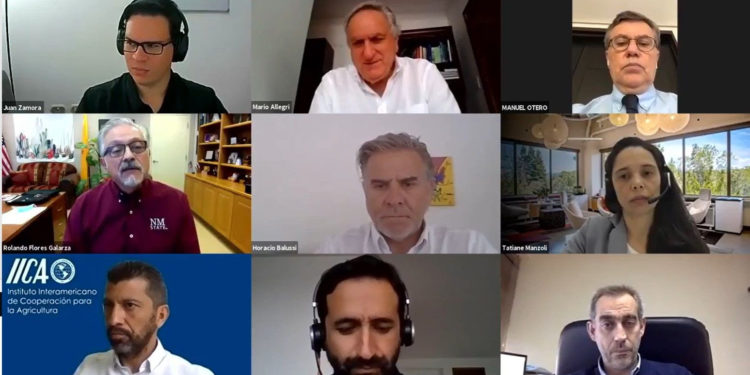| San Jose, 14 December 2020 (IICA). – Latin America and the Caribbean has the potential and responsibility to feed a growing population. To succeed in this regard, it requires technological innovations and good practices that would allow for renewing production systems to utilize resources more efficiently, agreed experts during a dialogue organized by the Inter-American Institute for Cooperation on Agriculture (IICA). Another point of consensus among the experts was that innovations developed in recent years have the potential to increase productivity in the countryside; however, in order for these technologies to have a tangible impact, it is important to close digital gaps in rural territories. Participating in the dialogue were researchers and academics from New Mexico State University (NMSU), the University of Cordoba in Spain, Purdue University and Cenfotec University, as well as experts from Microsoft and SAP, who analyzed and shared good experiences with Agriculture 4.0 in the hemisphere and discussed the factors that hinder its full adoption in countries of the region. Rolando Flores Galarza, Dean of NMSU, described the agriculture sector as crucial and highlighted the ways in which technology has allowed for “developing efficient systems to produce quality food with high added value, even in semi-arid climates”. He also indicated that these technological advances could allow for developing synergies between academia, the private sector and international cooperation. “We must recognize that we could develop projects aimed at complementing efforts related to agricultural digitalization. This, in turn, would allow for identifying topics of common interest and opportunities for collaboration with organizations like IICA”, stated Flores. Among the technologies that could have a substantial impact on agriculture, he cited artificial intelligence, robotics, machine-learning, blockchain and mobile applications for rural extension services, among others. “We cannot implement technologies in the field if farmers don’t believe in them or do not know how to use them. In this regard, Latin America and the Caribbean must set small challenges for the region and invest a great deal in training and in demonstrating that these technologies work”, remarked University of Cordoba professor Francisco Javier Mesas. “We must not see this as a strategy to gain competitiveness, but rather as an adaptation process that will be crucial for the survival of the sector. Increasing open data flows is one of the main recommendations to accelerate digitalization”, added Mesas. In addition to the pandemic, the disconnection between the most recent innovations and small-scale farmers has hindered the incorporation of technologies in the field. “Agriculture has allowed for feeding 650 million people across the hemisphere and supplying international markets. But we cannot continue to do more of the same; agriculture will need to internalize new technologies to a greater extent”, stated Manuel Otero, Director General of IICA. According to Otero, profound changes based on science and technology are necessary in the region, where “poverty affects almost 40% of the population and 16 million people do not know whether they will be able to eat tomorrow”. According to social scientist Jessica Eise, “first we must understand the conditions they face and then adapt tools to their reality”. “When we talk about agriculture and Information and Communication Technologies, we cannot get carried away with the latest innovations; we must focus on what farmers urgently need. It is important to acknowledge that one of the main obstacles is poverty, which prevents farmers from focusing on long-term objectives”, noted Eise. Emmanuel Picado, Manager of IICA’s Information/Communication Technologies and Digital Agriculture Division, explained that “digital technologies are a means of achieving the digital agriculture revolution, but in harmony with the ecosystem. As the key players in this process, producers must be able to utilize these technologies to achieve economic, social and environmental objectives, among other things”. Steps towards digitalization The experts also identified projects implemented or currently underway that demonstrate the potential and benefits of these advances for food production. With respect to management, the private technological company SAP is developing an application that allows farming companies to plan and manage agricultural operations for various crops. Another noteworthy initiative is BIT – Agrobit in Argentina. “We have developed a platform and mobile app that allows for monitoring 500 million hectares in real time and that generates alerts regarding incidents in the field, without the need to be connected to the Internet”, remarked Horacio Balussi, co-founder of BIT – Agrobit. The academic sector is also developing innovations for agriculture. NMSU, for instance, developed a robot that facilitates data collection in the field. “Thanks to robotics, we can monitor stress in soil. Autonomous data collection mechanisms to measure stress in soil and plants are important for water management. These systems allow for easily predicting certain irrigation interventions in the field, at a low cost”, stated NMSU professor Manoj Shukla. According to NMSU professor Lara Prihodko, “the complexities of food production afford opportunities to provide artificial intelligence solutions in the field”. “Given the current pace of climate change, we must swiftly adapt crops and livestock to these changes and identify behavior patterns in order to implement rapid interventions and make long-term management more accurate and intelligent”, stated Prihodko. IICA is also developing innovative projects to solve the challenges currently facing agriculture. One example is the promotion of a mobile-based rural extension program to solve the disruptions generated by social distancing amidst the health crisis. “While connectivity rates in urban areas are around 70%, they do not exceed 40% in the countryside. Women are among the most affected groups; they are also lagging behind the most in terms of training. We want IICA to serve as an innovation hub and bridge that connects to rural societies. New phone-based rural extension strategies are very important to us”, concluded Manuel Otero, Director General of the Institute. |









